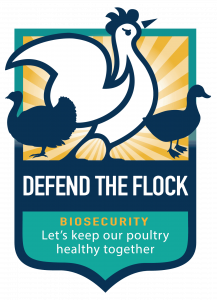Avian Influenza (AI) Guidance for Poultry Owners

The USDA and federal wildlife agencies, as well as the international animal health community, are making preparations to address likely avian influenza (AI) resurgence in the coming year. Europe is dealing with AI case numbers similar to the 2016 season and, with our wild bird populations getting ready for the fall migrations, exposure of domestic poultry to high- or low-pathogenicity avian influenza is likely.
What does this mean for our backyard and commercial producers?
- Keep your birds away from wild bird feeding/foraging sites. Especially if you have ponds or waterways on your land, you should keep your flock away from those sites. Geese and ducks are the most likely wild birds to carry AI.
- Look over the USDA’s avian biosecurity information.
- If birds in your flock are ill, or dying, use caution when handling them or cleaning the premises. Reach out to the UMaine Extension Veterinary Diagnostic Laboratory or to your veterinarian for diagnostic help to be sure it’s not AI or another serious condition.
- Keep your birds happy, well-fed, and clean. A well-managed flock is less likely to fall ill for any reason.
